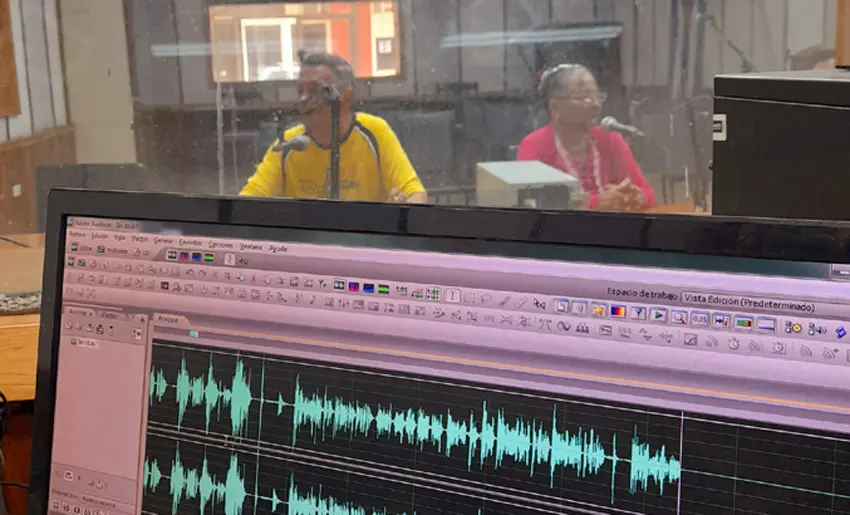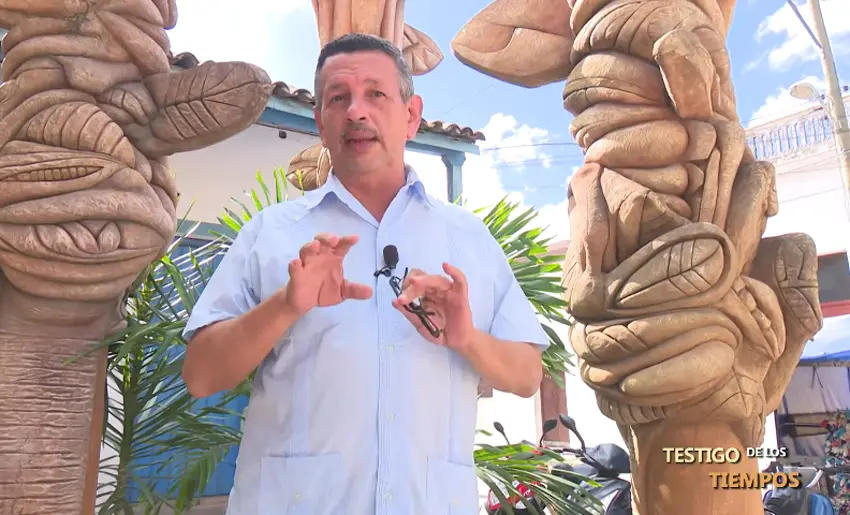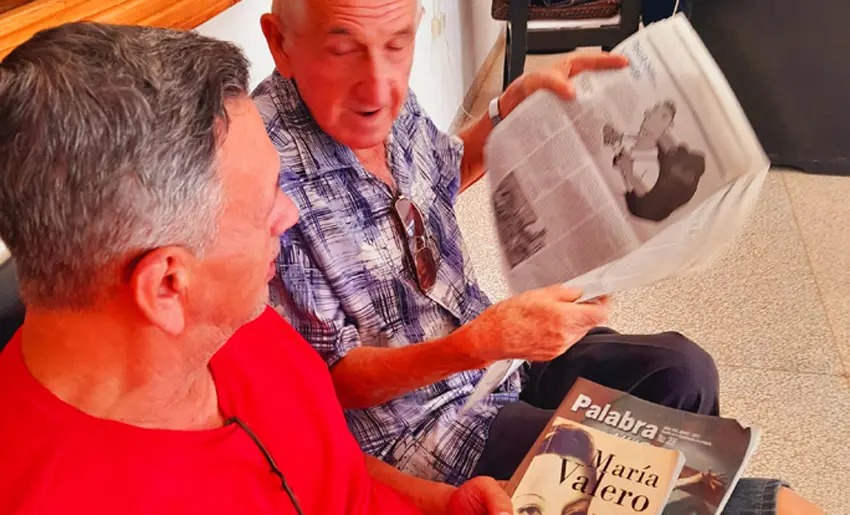César Hidalgo Torres is capable of penetrating into the most intimate part of his home at the least appropriate moments and yet he can refuse to leave it. He is a very dangerous person’ it cannot be otherwise who pretends to be listened to and wants to create a habit like a deadly drug.
It is worth the risk to this habit that turns us into assiduous followers of his programs of divulgation of history on radio and television. Few like this journalist-historian fascinates us with his stories in the media. His narration ranges from gritty battles to passionate and sensitive love stories.
What follows is the testimony of this César of radio, television and history. Let him be the one to tell about his life and work:
“I was born in a small rural place of the municipality of Báguanos, called Santa Teresa. There was no movie theater, no parks, no place to socialize. Just a pond so insignificant that as soon as I started my adolescence, it evaporated. Surely in the future archaeologists will find the fossilized skeletons of the biajacas fish. The only good thing about the place where I was born was the road that passed a mile away, a peasant and mythomaniac grandfather and an old battery-powered radio.
“At night’ the lights of the candlestick rather than light gave huge shadows that grew on the walls, giving fear, but it was because of the imagination of the people. The people I’m talking about were my grandfather and others of the same “ilk”, robust like him. Their hands had that inexplicable color that the earth and the sun gave them when they, headstrong, insisted that their crops would flourish among those rocky areas they called “haciendas”.
“Those people were the best talkers I have ever known. To hear them, I guessed they had their mouths full, even though they weren’t eating, but their tongues were fat. They should record those old peasants when they would tell the story they knew from hearing it from their elders and then transcribe them into books. I remember that when they spoke, they made what happened happen again. They were the ones who got me used to repeating what I hear (and read).
“Them and the old battery-powered radio. That device became the most important thing in the house and so much so that when the batteries didn’t come anymore, the accumulators or batteries from the tractors were used. The world of the radio episodes resembled my grandfather’s stories. And I simply became a fan. It was the radio that best kept the conversation alive when the dear old folks died. And that is the same as saying that the radio formed and shaped the culture of the community.
Radio, History, Holguin
“With the shyness of a country boy I joined Radio Angulo for the first time, almost by chance. First was Miguel Gutiérrez Guethon and then the other teachers: Rafael Peña Santana, Osvaldo Aguilera, Enma García. They had no higher education, but they had the blood of accountants, of palabreros, of palabrosos. And also Ana Irma Sanz, shy and guajira -and forgive the redundancy-, she taught me that you can play at being God, using the noises of life, music and words. And to begin with the well-worn phrase “there was once and again and again and again…”
“My vocation was adventures, that is, inventing adventures, fiction. What I wanted was to create a vigilante and almost supernatural character, who would confront the bad guys and defeat them. And that the strength to achieve his goal would be the love of a girl as pretty as my elementary school teacher was pretty. But the future had another mission for me that I had not realized.
“In 1994, the Cuban Radio started a series of programs to commemorate the centenary of the war organized by José Martí and I was “assigned” the task. I only knew how to organize chronologically the most significant events in real history and I remembered my teachers insistently repeating the nature of the confrontation and Martí’s forceful phrase that the war was “with all and for the good of all”. Then I read more history than I had ever read in my whole life. Those were very serious books with many chapters explaining the causes that unleashed the war and its conclusions.
“But the books I read lacked the flesh-and-blood people. I needed to know the percent of fear felt before combat, the nostalgia of lovers separated by war, the desperation to defeat the powerful enemy. This was the material I needed to tell about the heroes as they were told about the other heroes, the fictional ones that appeared forcefully heroic in the episodes of the old radio of my childhood. I didn’t want to teach history, that’s a teacher’s job. What I wanted was for listeners to sigh with emotion at the epic deeds of my ancestors. It was not to evaluate their lives, but to see them as they lived. Verb and not noun… Hence my fondness for memoirs, letters, anecdotes, biographies.
“When I met historians and became their shadow, watching them when they investigated, admiring them when they reached conclusions, I doubted a lot about my possibilities in that science. I was not very interested in enunciating concepts about an epoch, but in the process of living of the characters. In other words, my approach to the past was not rational but emotional. What interested me was to create images of the historical moment.
“I hesitated a lot. And I flatly refused to be called a historian. I am not. And I am not for lack of talent and knowledge. I do not study the research methods of history, but the language of mass media. My service to the knowledge of humans of the past’ is to tell their lives through media that massively reach humans of the present. My relationship with the past is one of admiration and my real commitment is to the people of today.
Radio, History, Holguín

“It’s not about appearing like the peacock. It is not about telling others: look how I know what you don’t know. It is to help those of the present to discover how those of the past acted in similar contradictions. It is to build a picture of a second of life and to make the picture as complete and human as possible so that people can “draw their own conclusions”. This work is similar to that of the historian, but I like to think that it is more similar to that of the geneticist and to say to people, as if without wanting to: “see or hear the zero minute in which the way of being and acting that we have now began”.
“Some historians have said of me that I am an intruder, that I talk about what I did not study. And maybe it’s true. History is a respectable and complex science to which one must dedicate one’s whole life and even more, if possible. That is why I refuse to be called a historian. What I am is a communicator through the mass media, a “conversationalist”, which is an equally respectable and complex faculty. A communicator who converses about events and characters of the past to help understand the present. Therefore’ the historian who comes to the mass media has to know about history and methods to investigate what is going to be said and methods to investigate how it is going to be said.

“Unfortunately’ not all historians know how to tell what they researched and that is proven when books sit on bookstore shelves for years with no one to buy them. Those books that no one buys usually suffer from one of two diseases. They are written with such monumental carelessness that they disrespect the most elementary rules of grammar and, therefore, it is very difficult to understand what they say. Or, on the contrary, the historian wants so much to be considered a scientist that he only gets a text so abstract that it is very difficult to understand. In these cases I always remember a writing teacher I had, who used to say wherever she could be heard: “only those who know a lot about something can explain it clearly”. And my good teacher used to say: “only those who think clearly can write well”.
“To speak in a mass medium (and the book is one of those media) and be accepted, you have to make yourself understood by everyone. That is why I do not think it is convenient to publish in book form what was written to be read by academics. Each medium has a language, which is the same as saying that each medium has a specific language.
Television, History, Holguín
The radio experience took César Hidalgo to Holguin Television, with a program on local history. Photo: YouTube channel of the program “Testigo de los tiempos”.

“My work has been, essentially, to translate into the language of radio and television the scientific works of historians. And I assure you that this is not an easy job, although there are those who believe it is. Recently, the National Union of Historians, in coordination with the ICRT, organized a one-week course for historians who wanted to be trained as radio and television scriptwriters. If it were that easy, we radio and television scriptwriters could aspire to become historians in another course that also lasts a week.
“The mass media (radio and television, but also printed press and books, and the controversial social networks and their infinite world of possibilities) are to society what the senses are to the human body; through them people see, hear, smell, taste, feel and express themselves and act. These media are so defining for the geography in which they are born and live, that I might as well ask the communities what their media are like and then tell them who or who they themselves are. Therefore, the way we use them should not be so festal.
“My particular work, which is modest and small, I have approached it with the eyes of a journalist and, when possible, with the methods of a historian. But that has only been the intention. The immensely great thing is the desire to trace the exceptional history of the region, which is the history of the inhabitants, my neighbors and cousins, always interesting, entertaining, full of grace and drama”.
“My particular work, which is modest and small, I have approached it with the eyes of a journalist and, when possible, with the methods of a historian. But that has only been the intention. The immensely great thing is the desire to trace the exceptional history of the region, which is the history of the inhabitants, my neighbors and cousins, always interesting, entertaining, full of grace and drama”.
- Néstor Salazar, from the microphone to the kitchen - 7 de October de 2024
- Did Henri Cartier-Bresson visit the city of Holguin? - 16 de September de 2024
- Zenovio and his trails of Cuban musical culture - 2 de September de 2024
